The shifting tides of coworking spaces
Today’s coworking space accommodates a variety of needs, with models and memberships constantly evolving to adapt to changes in demand. There’s something for everyone – whether you’re an entrepreneur looking to collaborate with other changemakers or you’re a small team wanting the vibrancy of a coworking space without losing your close-knit team environment.
In this blog, we’ll look at how coworking spaces have evolved over the years, why people seek them out, and the different ways you can be part of a coworking community – from memberships to rented workspaces.
A change in the working mindset
Coworking is just one of the ways our society has challenged the notion of what a traditional office means to its workers. As early as 1995, people were finding alternate ways of working, with a group of computer engineers starting up a “hackerspace” in Berlin. The space, called c-base, was established as a way for like-minded coders to come together and share knowledge.
A few years later in 1999, the term “coworking” was coined by American game designer Bernard DeKoven, who used it to describe the collaboration between people who were working together as equals. This ideology has flowed through to what we now seek out in coworking spaces today.
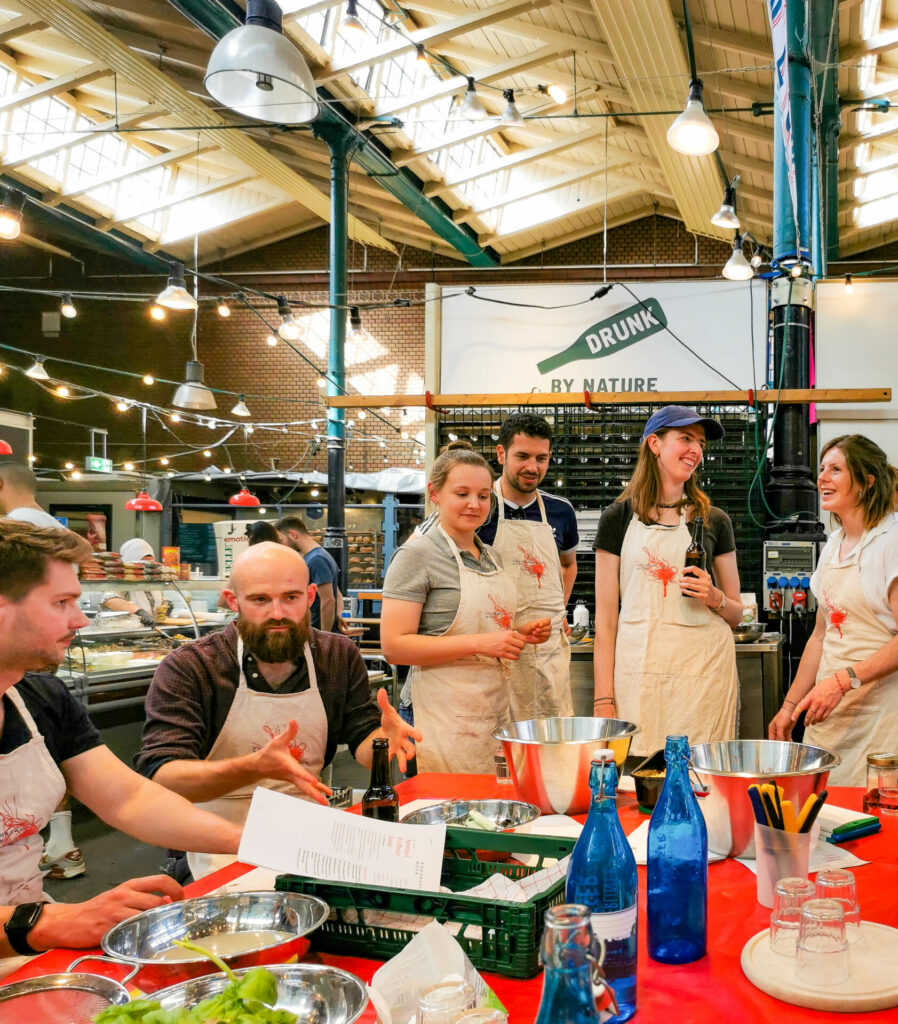
In 2002, two Austrian entrepreneurs opened a space called Schraubenfabrik, where like-minded people could work and create collaboratively. The “entrepreneurial centre” attracted PR consultants, architects, startups, and freelancers and was a way for professionals to get out of their work-from-home setup and into a more creative environment.
Software engineer Brad Neuberg opened what is considered the first official coworking space in 2005, a decade after the hackerspace was created in Berlin. He believed that working from home was an antisocial way of working and so established The San Francisco Coworking Space at Spiral Muse, which offered free Wi-Fi and a “healing space” with massage therapists. The idea wasn’t a success from the start – no one showed up in the first month – but the idea slowly gained traction and has since flourished, with coworking spaces popping up in countries all over the world.
A community-based, values-focused model
From 2020, when the pandemic forced the majority of people to work from home, there was a steep increase in remote-friendly software. This boom, which saw companies such as Slack and Zoom become fully integrated into the daily workflow, helped to establish a more flexible and independent way of working. No longer tied to having to go into an office, many found themselves choosing to work closer to home, or working while travelling abroad. This way of working saw more people fitting work into their schedules, rather than the other way around.
Logging into your computer from a cafe, airport, home office, or hotel foyer, where a desk and (mostly) reliable Wi-Fi can guarantee a productive day, is highly motivating. However, it doesn’t make up the full picture of what many entrepreneurs or startup teams strive for – communication and community.
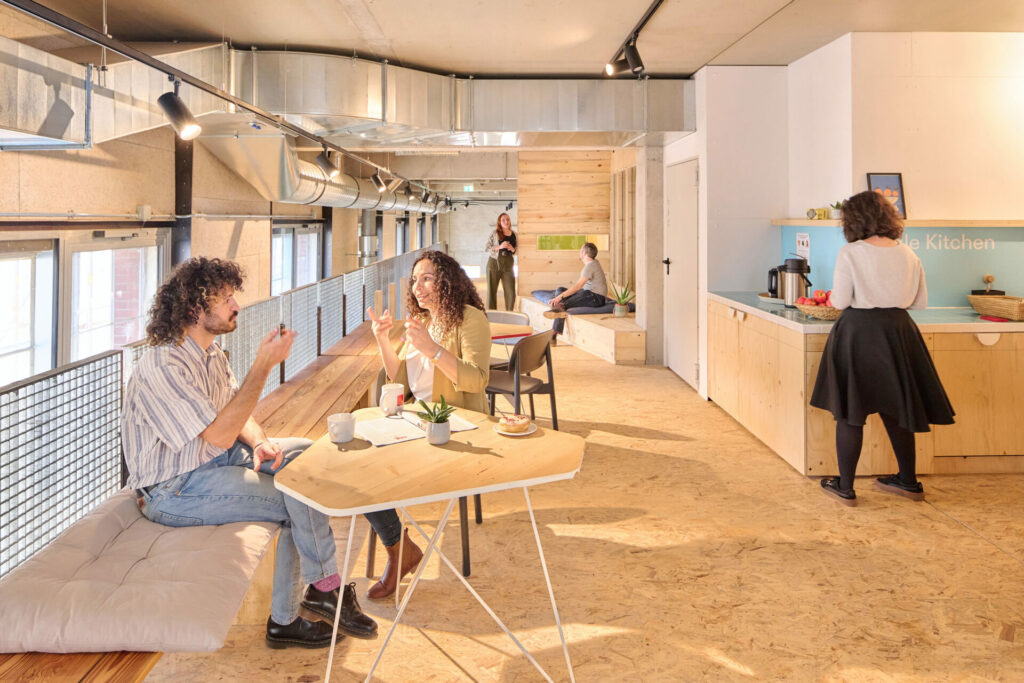
Think back to the “water cooler chats” within traditional office spaces. This form of non-work communication helped to foster community within a company and boost the morale of its workers. An MIT study found socialising helps to increase productivity and helps people feel more connected to their work. A sense of belonging is one of the major needs that motivate human behaviour, according to American psychologist Abraham Maslow. It’s also understood that increased social connections can help lead to reduced stress and more resilience in work environments.
What if there was a shared workspace where water cooler chats were not only common but encouraged? A space where you can not only work as flexibly and independently as you like but where you can be surrounded by like-minded people who are open to collaboration? This type of environment is, for many impact innovators, the key to their productivity and healthy mindset.
Let’s dive into how entrepreneurs and startup teams can embrace this way of working.
Coworking space memberships
The most common way to join a coworking space is with a membership. These monthly/yearly models offer impact innovators a space to work from and also a way to become part of a community of individuals who often share similar goals and values.
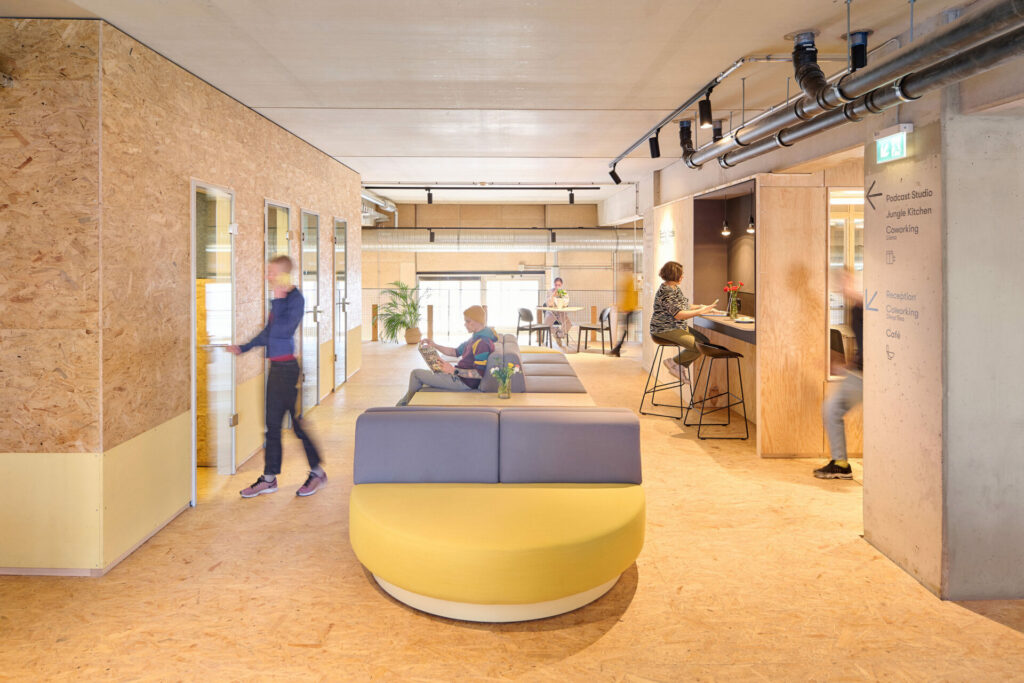
Take for instance our very own Impact Hub Berlin. Our award-winning coworking space offers members multiple levels of open spaces, team areas, meeting rooms, flex desks, podcast recording booths, studios, labs, and more. The design of the space is based on the principles of New Work, a philosophy that offers alternative approaches to traditional structures, promoting creativity and innovation.
Sitting within the former Kindl brewery in Neukölln, our space is a testament to the benefits of a circular economy, with 70 percent of materials and products used being recycled, reused, or renewable. This holds true to our holistic impact ecosystems of circular economy, sustainable food, diversity, equity and inclusion, and green tech. Our space attracts those who are working to create positive change within these fields and fosters collaboration between like-minded impact innovators.
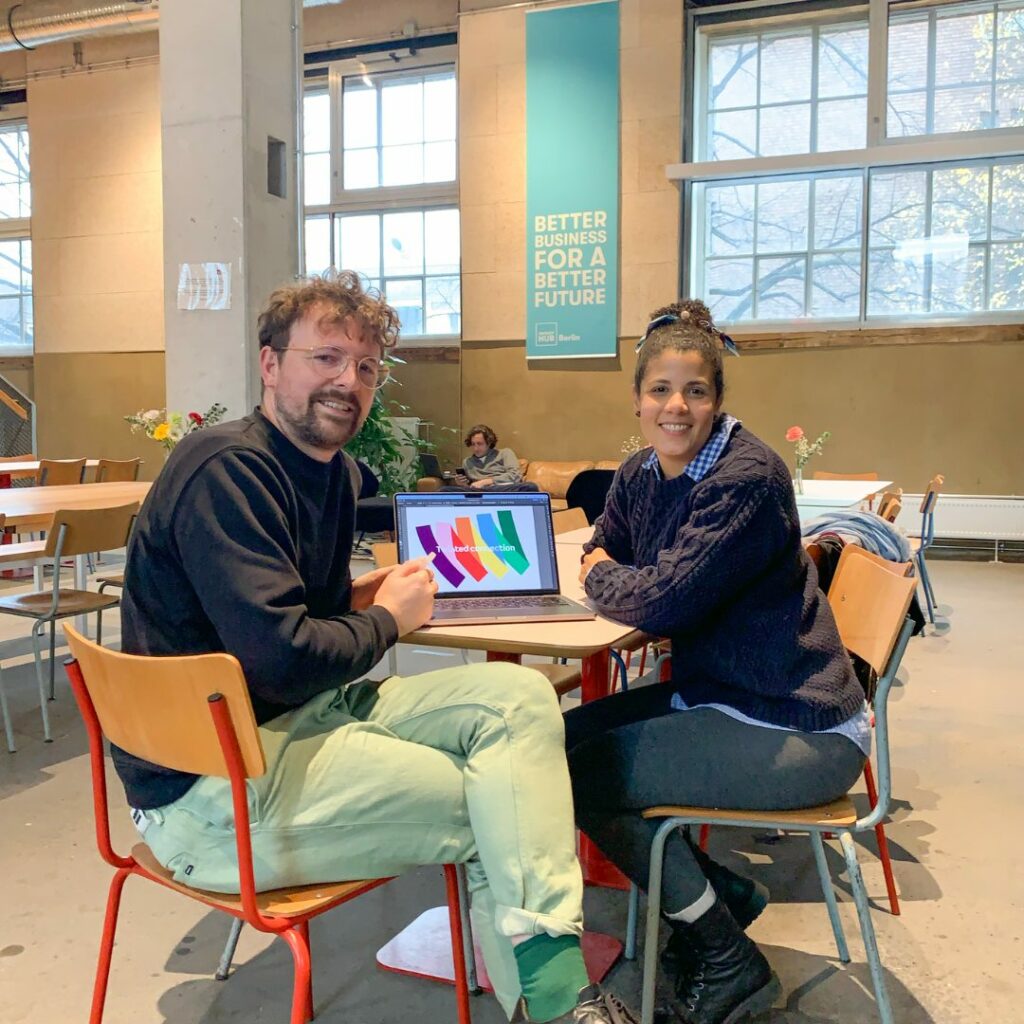
By finding a coworking space that prioritises a community-centric space, impact innovators can co-create and build on their work via meaningful connections and partnerships. At Impact Hub Berlin, we believe impact happens when people work together, which is why we’ve built communal spaces to help our members better connect, such as The Loop cafe, our expansive lounge area, and shared spaces where conversation and ideas can flow freely between our community of impact entrepreneurs. From these interactions, we’ve seen our community connect to help create a more positive impact in our society, from entrepreneurs joining forces to create a startup focused on tackling e-waste, to a designer helping an entrepreneur bring their social impact business brand to life.
Community building is another key feature many seek out when choosing between coworking memberships. At Impact Hub Berlin, a membership secures access to hundreds of supportive change agents, not only in Berlin but also across the globe. With an Impact Hub Berlin membership, you can break free from the work-from-home funk and build personal connections as well as professional collaborations. We offer wellness programmes, coffee chats, and a weekly newsletter to stay up-to-date on what’s happening in our community. A membership also provides access to our local Slack workspace, where our community shares ideas, insights, events, and more.
Coworking spaces can go further than community building, they can also be a space where entrepreneurs can accelerate their mission-driven initiatives. At Impact Hub Berlin, our community offers the tools and support needed for those wanting to scale their impact, with resources, knowledge, and mentorship programmes suited for every stage of development. We also offer incubator and accelerator programmes targeting specific areas of social impact, whether that’s climate tech or food sustainability. These run regularly, with applications open to entrepreneurs looking for financial support, individualised coaching, partnerships, and marketing solutions.
Rented workspace within a coworking environment
Impact doesn’t happen in isolation. Coworking spaces can also offer small startups the ability to work privately in their own rented workspace within a wider community of change.
At Impact Hub Berlin, we offer separate rented workspaces up to 51m², where teams can feel inspired without being isolated from other companies, peers, insights, or ideas. Renting a workspace means you not only get an office space for you and your team but also all the perks that come with being part of the Impact Hub Berlin community.
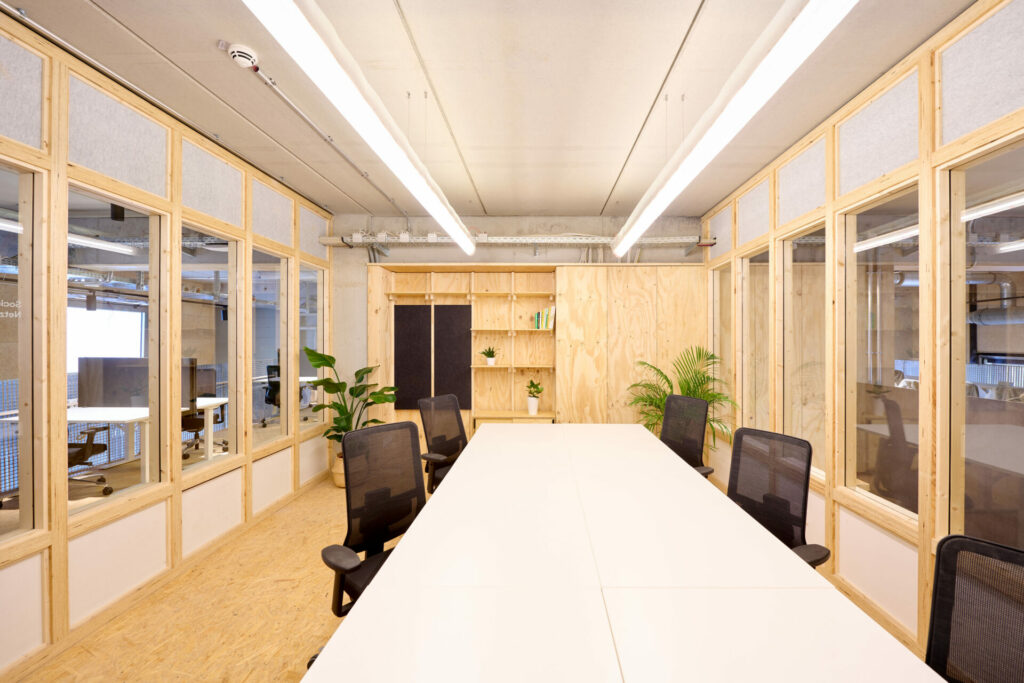
These workspaces come fully furnished with desks, chairs, and storage so there’s no need to worry about costings for office fitouts. These spaces also come with cleaning services and no overhead costs, lowering the barrier to entry for teams who want to put their energy into creating positive social change within our society.
With access to not only a small private space but also communal areas and workshop rooms, our rented workspaces help teams follow a more sustainable way of operating. We also offer an Office Flex option, which provides flexibility for growing teams. An Office Flex bonus combines a fixed rented workspace with coworking membership(s) for occasional or regular teammates. This option helps to support changing team sizes and hybrid working trends within a single streamlined billing process for easy administration.
Finding what’s right for you
Whether you’re a solo entrepreneur or the founder of a small startup, there are plenty of ways a coworking space can fit your needs. More than just a flex desk, coworking spaces have shifted to become community hubs working to drive positive change in our world. With flexible access options and an environment that fosters impact innovation, coworking spaces have evolved the way we think about how we work.
If you’d like to join our Impact Hub Berlin community, whether that’s becoming a member or renting an office space, we’d love to hear from you!
Sources
- https://de.wikipedia.org/wiki/C-base
- https://www.c-base.org/cv50f/
- https://theconversation.com/quitting-the-cubicle-farm-for-coworking-19517
- https://www.schraubenfabrik.at/story/
- https://theaseanpost.com/article/coworking-reshaping-workplace
- http://codinginparadise.org/ebooks/html/blog/start_of_coworking.html
- http://codinginparadise.org/coworking/